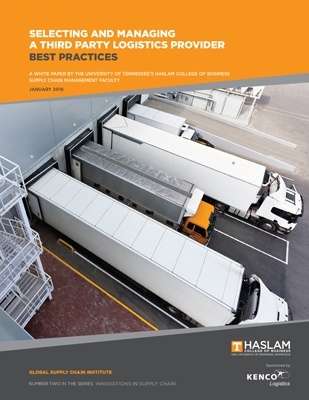
You put a lot of thought into the goods and services that drive your business. You’ve likely done intensive research into products ranging from office computers to the equipment your team uses to run your warehouse. You’re price-conscious because it’s important to the success of your business, and you want to be sure that you’re making the right financial moves to encourage company growth.
While you’re excited at the prospect of working with a 3PL, you may have a few lingering questions that deserve answers before you commit. There’s no need to worry, you’ve come to the right place to get answers.
Does Hiring a 3PL Mean I Lose Control?
While it might seem counterintuitive at first, trusting your operations to a 3PL may actually give you more control over your own success, not less.
Consider how many “hats” you’re currently attempting to wear: research and development, manufacturing, sales, marketing, and distribution—and that’s probably not even all of them. Getting your products to your customers when they want them, how they want them, in the quantity they ordered, and damage-free demands a lot of oversight. This is especially true with e-commerce and omnichannel distribution becoming more prevalent. Picking is more labor-intensive, which opens the door for potential automation. Customers want more visibility, which can exceed your IT systems’ capabilities. In short, gone are the days when most companies could ship in pallet or case quantities and satisfy their customers if the product arrived approximately when it was expected.
The most successful companies have turned their logistics network into a competitive advantage instead of just a cost of doing business.
Partnering with a 3PL who specializes in helping companies meet the increasingly complex demands of their customers can allow you to have more control of your distribution network while at the same time increasing customers satisfaction and controlling costs.
Will Hiring a 3PL Cost Me a Lot of Money?
As with any service, there is a cost associated with using a 3PL to help your business grow and run efficiently. From the fees you pay, however, comes valuable peace of mind worth far more than an invoice.
Imagine never needing to hire another engineer, warehouse laborer, or floor manager and the burden it will lift off of your HR department. Imagine not needing to maintain the condition of your warehouse and the equipment in it. Imagine delegating the responsibility for meeting your safety, quality, service, productivity, cost, and morale goals to a proven organization with experience in doing just that.
That’s time you won’t need to spend researching, negotiating, updating, maintaining, and managing all the moving parts of your warehouse, and more time you’ll have to devote to the rest of your organization.
Will Using 3PL Services Save Me Money?
 A smart investment requires two things: a researched buy-in and patience. Working with a 3PL is no different; you’ll need to give your new partnership leeway and time for cost savings to show through and remember that they may not be as obvious as line items on an invoice.
A smart investment requires two things: a researched buy-in and patience. Working with a 3PL is no different; you’ll need to give your new partnership leeway and time for cost savings to show through and remember that they may not be as obvious as line items on an invoice.
Your 3PL partnership may positively affect a variety of areas in your company, including reducing your inventory cost by improving inventory accuracy to the point where safety stock can be decreased, reducing damages and customer returns through improved handling processes, and reducing workers’ comp claims, employee turnover, and customer chargebacks. These are the results many customers who partner with 3PLs enjoy in addition to commonly experiencing labor cost savings.
Curious to know more about the benefits of 3PL partnerships? This white paper is an excellent example of the ways a 3PL can cut costs across the board through smart management techniques and industry experience put into action.
How Much Of My Budget Should I Allocate to My 3PL?
“Your mileage may vary” holds true here: the needs, volume, and speed of your business, along with the requirements of your customers will largely dictate how much you’ll need to divert to your 3PL.
Transportation, for example, will almost always compose the lion’s share of your distribution costs, coming in at somewhere around 65% for most shippers. Companies that choose to outsource warehousing but not transportation management will almost always allocate a smaller portion of the budget to 3PL spend.
It’s important that you take the time to perform an internal assessment and document the goals you hope to accomplish by partnering with a 3PL.
That will help you as you evaluate 3PL services and determine which portions of your distribution network you choose to outsource. Seek a partner who has proven experience in delivering the results you desire.
Do I Need to Outsource All Of My Third-Party Logistics Needs At Once?
If you haven’t really dipped a toe into outsourcing logistics before, you don’t necessarily need to cannonball right into the pool. While it’s true that 3PLs generally deliver a higher ROI the more reins they’re given, nervous beginners can start out trying outsourcing for one or two pieces of their operations at a time, building as they go along.
It is not uncommon for shippers to initially outsource a small portion of their distribution network, such as a single warehouse or small number of sites, to a 3PL. Once the 3PL begins to gain the customer’s trust and deliver the performance expected, the partnership often grows deeper and the 3PL begins to manage other services as well. Many shippers find it more effective to outsource multiple aspects of their distribution network to a single 3PL.
This allows them to leverage their buying power, take advantage of 3PL systems (WMS, TMS, YMS, LMS, etc.), which are already integrated, and have a single point of contact for managing their logistics network.
Other customers choose to partner with multiple 3PLs as they believe that a little internal competition is healthy.
To Sum It Up
You trust partners in your supply chain every day—to source the right products, to assemble the right components, to deliver the right goods. A 3PL is a natural extension of that trust and a valuable partnership with a team that has your best interests in mind. After all, the business model of a third party logistics provider is dependent on your ongoing success, and there are few “insurance policies” more reassuring than that. If you’ve been considering using a 3PL, now is the time to act: continue your research on our In Depth Guide to 3PL Pricing and contact Kenco today to discuss what we can do for your business.
